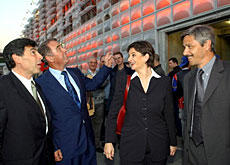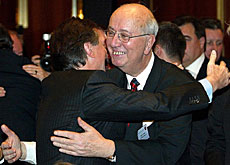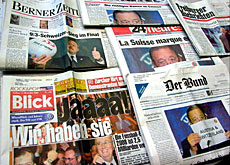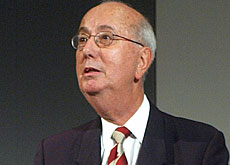Football for all in Switzerland

Former Swiss sports minister Adolf Ogi has welcomed Switzerland and Austria's successful bid to host the European football championships in 2008, declaring "joy is everywhere".
Ogi, one of the fathers of the Swiss Euro 2008 candidacy, says Switzerland must now prepare to meet the challenge.
Adolf Ogi talks to swissinfo about how Switzerland scored the European football championships and the road ahead to Euro 2008.
swissinfo: Was Switzerland awarded the Euro 2008 because of Austria’s long-standing relationships with major international bodies, such as the European Union and United Nations?
Adolf Ogi: No, I don’t think so. The joint candidacy was very professional and convincing – and that’s why it was successful. One cannot directly compare it with Switzerland’s bid for the 2006 Winter Olympics and the European championships. With Uefa [European football’s governing body], it’s only the 14 members of the executive committee that make the decision. In the case of the Olympics, many more players are involved.
swissinfo: There is only one stadium in French-speaking Switzerland where a Euro 2008 match will be played – and none in Ticino. Will French and Italian-speaking Switzerland be caught offside during the event?
Adolf Ogi: When I look at the reaction of the Ticino press after the decision, I don’t think so. They were clearly thrilled with the decision. Besides, no stadium in Ticino meets the demands of Uefa regarding capacity and safety – and there are no plans to build one. I am also convinced that the people from the French and Italian-speaking regions will be happy with the championships.
swissinfo: When a country or region is not performing well economically, sport can become a sort of social “cement.” Is this an explanation for the current football euphoria in Switzerland?
Adolf Ogi: Sport can bring people closer together and guarantees a feeling of togetherness. With our recent successes we are seeing a chain reaction, which is causing increasing enthusiasm for football. And the championships are good for us – the challenge is now.
swissinfo: The last major international athletic event held in Switzerland was the football World Cup in 1954. Why has Switzerland had to wait so long to host another major sporting event?
Adolf Ogi: That’s not completely true. Since 1954 Switzerland has hosted a series of major athletic events. For example the world ski championships were held in St Moritz in 1974 and in Crans-Montana in 1987. We have also hosted curling and fencing championships. However, it is true that the international football championships and the Summer Olympics are the major sporting attractions worldwide. And Switzerland is home to many international sport committees.
swissinfo: Eastern Switzerland complains that it is isolated from the capital of Bern. Could the Euro 2008 help to change the importance of this region by acting as a “bridge” to Austria? Can football actually do that much?
Adolf Ogi: I think eastern Switzerland could benefit from its “bridge” position, but the initiative must clearly come from the region itself. It would be an exaggeration to say that football alone can change everything, however.
swissinfo: The tourism infrastructure in Switzerland is no longer first class and the Austrians are ahead of Switzerland. Do you think that Euro 2008 can improve the situation?
Adolf Ogi: It’s true that the Austrian tourism industry is ahead of us in certain areas and value for money is certainly better there. I think we can learn from the Austrian tourism industry.
swissinfo: Austrians fight for the same tourists as the Swiss. Can the two still be good business partners?
Adolf Ogi: Naturally. We have been good friends for many years because we share many political and economic characteristics.
swissinfo: In 1999, Switzerland lost out to Italy in its bid for the 2006 Winter Olympics. Austria was also in the running. The two countries were competitors and neither won. Is that why the two decided to join forces?
Adolf Ogi: No, of course not. The whole process goes back to my visit to Austria in 2000 when we discussed the possibility of collaboration. In June of the same year, the idea was discussed at Uefa. And now we have been accepted.
swissinfo: You were also manager of the Swiss Ski Association. In recent years, Austria has outperformed Switzerland in skiing, making the situation almost intolerable for some Swiss.
Adolf Ogi: I do not like the term “intolerable” to be used in connection with sports. There are always winners and losers but one must not eternally mourn a game. You have to look ahead, even after “defeats”, like our loss of the 2006 Winter Olympics bid. Long before the “Austrian years”, we had a lot of success in alpine skiing.
swissinfo: What can the Swiss learn from their Austrian neighbors?
Adolf Ogi: In general I think that sport has greater significance in Austria – where it is more strongly promoted both politically and economically – than it does in Switzerland. I hope that my sport initiatives, which have been approved by the Swiss government, contribute to the significance of sport in Switzerland.
swissinfo: The Euro 2008 bid had little opposition compared to the Olympic bid. Is Switzerland becoming friendlier toward sport?
Adolf Ogi: In general, one cannot say that. I believe that the Swiss population was strongly behind the 2006 Winter Olympic bid. But sport can also inspire enthusiasm in new circles. The Euro 2008 application was very professional. Thomas Helbling managed the dossier very well and with a lot of emotion. He achieved admirable harmony with his Austrian colleagues.
swissinfo: European national football teams have players from a variety of cultural backgrounds. The Swiss national team has many second-generation Swiss. What do you think of that?
Adolf Ogi: Sport can be a good example of successful integration. In Switzerland, sport is ahead of politics. I don’t want to say that the sports world is some kind of paradise, but it can often serve as a signal that integration is possible. On the other hand, it’s sad if sporting events – such as the match between Algeria and France – must be cancelled for fear of violence.
swissinfo: Does football hold this multicultural country together?
Adolf Ogi: It certainly makes a contribution. Sport as a whole plays a politically important role in Switzerland because it supports contact, unity, and exchange between various regions. The traditional “Swiss sport events,” such as wrestling and gymnastics, contribute to national cohesion. And finally, we cannot take for granted that our country has managed to remain united since 1848.
swissinfo: You are the United Nations Special Adviser on Sport for Development and Peace. What would have been the effect of the selection of the Turkish-Greek or of the Bosnian-Croatian candidacy? Was this not a missed chance?
Adolf Ogi: No, I would not say that. Of course, sporting events hosted by nations that are not on friendly terms can teach us lessons – as we saw with the football World Cup in Japan and South Korea this year. Sport can help build bridges, which I see again and again through my work with the UN. And I truly believe that such candidates could win the bid to host the next European football championships.
swissinfo, Rita Emch
In February 2001, Adolf Ogi was appointed as special adviser to the UN on sport for development and peace.
Ogi was the president of Switzerland in 2000 and 1993. For a number of years he was head of the Federal Office for Sport.
Ogi presided over Sion’s bid to host the 2006 Winter Olympics.
He was head of the Swiss Ski Federation from 1975 to 1981.

In compliance with the JTI standards
More: SWI swissinfo.ch certified by the Journalism Trust Initiative



You can find an overview of ongoing debates with our journalists here. Please join us!
If you want to start a conversation about a topic raised in this article or want to report factual errors, email us at english@swissinfo.ch.